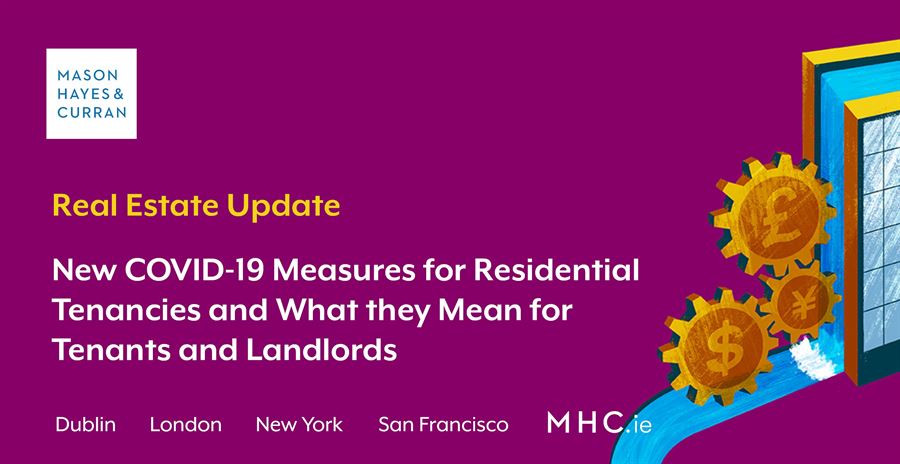
In recognition of the on-going pandemic and its effect on the residential tenancy sector in particular the ability of certain tenants to pay rent, existing protections have been extended albeit with certain revisions and exemptions. The regime is provided for in Part 3 of the Planning and Development, and Residential Tenancies, Act (New Regime). A note on the previous regime under the Residential Tenancies and Valuation Act 2020 can be found here (Old Regime).
The New Regime will protect tenants in the period 11 January 2021 to 12 April 2021 (Emergency Period) where they are at risk of losing their tenancy as a result of being financially impacted by COVID-19. There are instances where the regime will not apply.
Key tenant protections
The following apply during the Emergency Period:
- A restriction on rent increases coming into effect during the Emergency Period with no back-dating of rent increases allowed, and
- Extended notice periods for termination based on rent arrears. Termination notices must provide a minimum of 90 days’ notice, rather than the usual 28 days, and the termination notice must not specify a date earlier than 13 April 2021
Qualifying criteria
To qualify for the protections, a tenant must:
-
Be or have been entitled to receive a COVID-19 related support at any time during the period from 1 August 2020 until 12 April 2021
-
Provide the Residential Tenancies Board (RTB) with a written declaration (the Declaration) confirming that a) they are unable to pay their rent due as a result of being in receipt of such COVID-19 related support and b) as a result there is a significant risk of their tenancy being terminated. A true copy of this must also be provided to the landlord
-
Request assistance from the RTB in seeking advice similar to that provided by the Money Advice and Budgeting Service (MABS) (Financial Advice), and
-
Within 5 days of serving the declaration, serve a notice on their landlord seeking a consultation to put in place a rent payment plan
Tenants who qualified for protections under the Old Regime scheme
Tenants who fell under the Old Regime on 10 January 2021 and who had already served a declaration on the RTB qualify for protection under the New Regime. They are not required to serve a new declaration on the RTB. However, they should do the following on or before midnight on 15 January 2021:
- Serve a notice on the RTB similar to point 3 above, unless the landlord has served a warning notice of rent arrears on the tenant already and the tenant has already obtained Financial Advice following provision of information to him or her by the RTB, and
- Serve a notice on the landlord similar to point 4 above, unless the tenant has already been served with a rent arrears notice, has taken such Financial Advice and, after obtaining such advice, has made an arrangement with the landlord for the payment of the rent due
When will the protections not apply?
The protections will not apply or cease to apply where:
(i) Tenants do not satisfy the points at 1 – 3 above
(ii) A tenant is in rental arrears for 5 months or more, whether for a continuous period or in total, as at 10 January 2021
(iii) A tenant fails or refuses to provide the information sought by the RTB or other person in connection with the giving of Financial Advice, or
(iv) A tenant does not comply with the terms of any rent payment plan agreed with the landlord
A landlord can also displace the tenant protection by serving his or her own declaration on the RTB, with a true copy required to be served on the tenant. The landlord’s declaration is permitted where:
- The rent is in arrears for a continuous or total period of 5 months or more as at the date of the declaration, or
- The tenant has failed to comply with (III) or (IV) above, or
- The protections would cause undue financial hardship to the landlord
A landlord may claim “undue financial hardship” in the following circumstances:
- They are or have been entitled to receipt of a COVID-19 related financial support at any time from 1 August 2020 until 12 April 2021
- The rental income concerned is their sole or main source of income, or
- The rented property is subject to a mortgage which the landlord will likely default upon if the rent remains unpaid for the duration of the Emergency Period
It is an offence for a tenant or landlord to make a false or misleading declaration.
Level 5 restrictions and the Act
The Residential Tenancies Act 2020 operates as a blanket ban on evictions coming into effect, subject to limited exceptions, where there is a 5km restriction on peoples’ movement in place. This currently applies nationwide until the end of January 2021. A note on that act can be found here.
The new Regime does not impact on this blanket ban but instead operates independently of it. Certain tenants may fall under the protections afforded by both Acts.
Conclusion
The new regime is the latest in a series of residential tenancies legislation introduced since the onset of COVID-19. The frequency and speed at which the various pieces of legislation have been introduced since last March may well cause confusion. However, the new regime and, in particular, the reliefs available to landlords go some way to strike a balance between the rights and interests of landlords and tenants.
For more information, contact a member of our Real Estate team.
The content of this article is provided for information purposes only and does not constitute legal or other advice.





